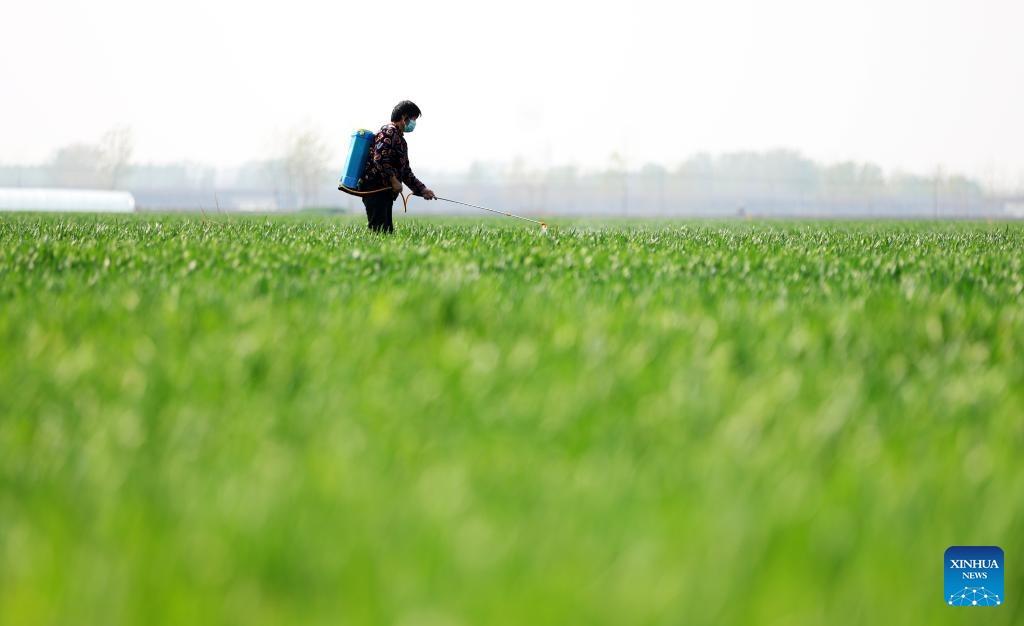 A farmer works in a field in Tancheng county, Linyi city, east China's Shandong province, April 9, 2023. (PHOTO / XINHUA)
A farmer works in a field in Tancheng county, Linyi city, east China's Shandong province, April 9, 2023. (PHOTO / XINHUA)
Deepening engagement will contribute to global food security, diplomats say
Senior diplomats of China and the United States have said they expect agricultural engagement between the two countries to remain strong to benefit both and contribute to global food security, even though tensions continue to be high in their relations.
"Despite the ongoing difficulties in the bilateral relations, high enthusiasm and expectations remain across the two agricultural sectors and societies. This fully demonstrates the momentum, resilience and potential of bilateral agricultural cooperation," Xu Xueyuan, Charge d'Affaires of the Chinese embassy in the US, said on April 4.
Speaking at the 2023 Annual US-China Agriculture Roundtable in St Louis, Missouri, Xu said that as major agricultural countries, both nations give priority to the stable growth of agriculture, the countryside and farmers' income.
READ MORE: Farmers at heart of push for better ties
"When China and the US work together, we would bring about better well-being for our peoples," she said at the event, hosted by the US Heartland China Association, based in Missouri.
Xu Xueyuan, Charge d'Affaires of the Chinese embassy in the US, said the global agricultural market has undergone continuous fluctuations as a result of climate change, regional conflicts, COVID-19 and other factors in recent years, and that a healthy agricultural trade relationship between China and the US will help stabilize global markets of food and major agricultural products
Themed on "Global Food Security: Rise to the Challenge", the roundtable is scheduled to be followed by an online think tank dialogue on Tuesday, and a virtual agricultural education dialogue on Thursday.
In 2022, the value of US agricultural and related products exported to China reached a record $40.9 billion, an increase of 14.5 percent compared with the previous year, making China again the largest market for US exports, the US Department of Agriculture said in February.
Solid foundation
The figures reflect the solid foundation of the agricultural trade between the two sides. They are also a result of China's continued efforts to provide tariff exclusion and trade facilitation for US agricultural products despite COVID and other adversities, Xu said.
In comparison, China's agricultural exports to the US, though on the rise, remained "relatively limited" in scale and variety.
ALSO READ: US congressman urged not to undermine China-US ties
"We hope to further expand two-way trade, and export more aquatic products, vegetables, fruits and other high-quality, specialty products to the US," Xu said.
In addition to trade, the two countries can explore new areas of cooperation to achieve modernization of agriculture, for example, by working together on climate-smart agriculture, soil health, food waste, new varieties, new technology and new equipment, she said.
Agricultural cooperation between the two countries in a wider range of areas will help set an example for global agricultural development, the diplomat said.
She said the global agricultural market has undergone continuous fluctuations as a result of climate change, regional conflicts, COVID-19 and other factors in recent years, and that a healthy agricultural trade relationship between China and the US will help stabilize global markets of food and major agricultural products.
"Together we account for 20 percent of global agricultural imports and 15 percent of exports. If China-US agricultural trade gets unstable, the global market gets unstable as well," she said.
The roundtable was attended by agricultural delegations from Jiangsu, Shandong and Hebei provinces, making Chinese participation the largest at the event since the start of the pandemic.
ALSO READ: Sino-US ties should be based on mutual respect
Speaking via video, US Ambassador to China Nicholas Burns said that maintaining a constructive agricultural relationship is very important for the overall bilateral relationship between the US and China.
Burns said that he had recently discussed with Chinese Minister of Agriculture Tang Renjian and both shared an interest in increased and ongoing agricultural engagement.
"America's agricultural engagement with the PRC remains strong and is a major positive part of our overall relationship with China and with the Chinese people," Burns said, according to a transcript issued by the embassy on Friday.
"The overall health of our agricultural relationship with China is strong, however, and I expect it to remain strong in 2023," he said.
Top market
Burns noted that China was the top market for US agriculture in the last three years, equating to almost 20 percent of all US agricultural exports on an annual basis.
"Agricultural trade brings jobs and income to rural America. Agricultural trade is making a real and positive difference to our rural communities, across the heartland and in all our farm and ranch states, and in fisheries states like my home state of Massachusetts," he said.
Goods exports from Massachusetts to China increased by 32 percent year on year to reach $3.5 billion in 2021, with 11 percent of the state's global goods exports bound for China in 2021, according to US Export Report 2022, issued by the US-China Business Council.
READ MORE: China minister calls for improved Sino-US economic ties
In his speech, Burns also listed issues of concern in agriculture, such as agricultural biotechnology, which he said is critical to achieving global food security and global climate-smart agriculture goals.
Burns said relationship with China is a "difficult, competitive relationship on many issues", but the US has also said consistently that "we are ready to work with the PRC when our interests coincide", and they include climate change, agriculture, food security, global health and narcotics.
China and the US are the two largest economies and "our bilateral engagement affects not just the two of us, but the entire world", he said.
huanxinzhao@chinadailyusa.com


